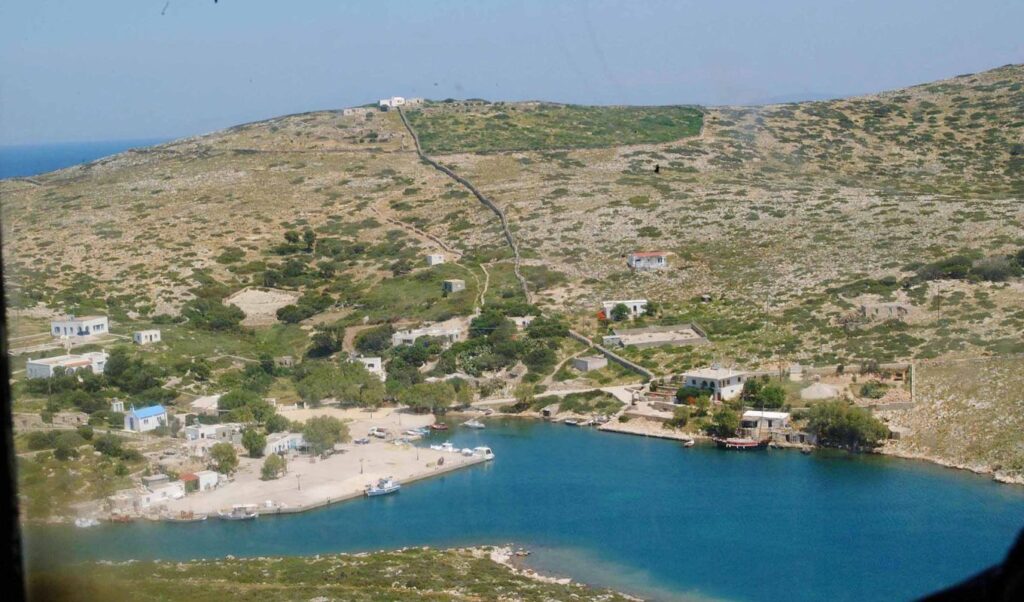Arkoi Island. This small Aegean Sea paradise, with its crystal-clear waters perfect for luxury tourism and complete seclusion, finds itself entangled today in an absurd web of complications. On one side, the threatening presence of Turkish fishing boats in Greek territorial waters, and on the other, a wave of lawsuits from the Greek state itself against residents, based on… Ottoman Law. Caught in the middle are the Holy Monastery of Patmos, state delays, and a local community in turmoil.
It’s no coincidence that Arkoi attracts high-income travelers from both Greece and abroad, while many entrepreneurs scout the area for potential tourism investments, as it remains one of the few untouched diamonds of the Aegean. However, for many years now, instead of being a flagship destination for traditional hospitality and private vacations, this border island has suffered from various issues including inadequate ferry connections, insufficient medical care, and often non-existent water supply… Just as some initial solutions seemed to emerge this past year, the situation has reached a breaking point with a major issue raising serious questions.
Every day, local fishermen come face-to-face with Turkish trawlers within domestic waters, while their fellow residents and Arkoi property owners find themselves awaiting developments, having received a barrage of lawsuits from the Greek state along with many unexplained delays.
Chronicle of an absurd entanglement on Arkoi with residents fighting for their properties
What exactly has happened? The Ministry of Finance, invoking Ottoman Law, has challenged the property ownership of both permanent residents and those who own property on Arkoi, despite their legitimate Greek state documentation. It claims houses and plots, even though in both cases the properties were acquired through purchase contracts and despite the fact that Arkoi residents have been consistently compliant with all their obligations (property taxes, municipal fees, land registry, building regularizations, etc.).
Beyond the fact that many residents have already bled financially for legal expenses, they cannot understand the absurdity of the situation. According to parapolitika.gr sources, in many cases where they were acquitted in first instance, they faced appeals from the Ministry of Finance, again invoking Ottoman Law to continue claiming their property. “After much pressure, we managed at the beginning of the year to make initial contact with the relevant authorities at the Ministry of Finance, who told us the issue would receive a six-month extension to provide a definitive solution,” Diamantis Mantis, representative of the island’s residents, tells parapolitika.gr, explaining that this pause was meant to allow the ministry time to proceed with relevant legislation for the definitive relief of property owners on the island. “Today, eight months have passed and unfortunately, the Ministry of Finance has not only failed to proceed with a definitive resolution, but provides no related updates, which renews residents’ anxiety and wastes precious time and money,” he adds, sharing his fellow residents’ inability to understand why no final solution is given after so much suffering. Indeed, Arkoi residents are intensely wondering lately if there’s some benefit behind this absurd delay.
Arkoi: How lawsuits, Turkish threats and legal chaos threaten the “diamond of the Aegean”
Parapolitika.gr contacted Dimitris Michiotis, Athens attorney representing many Arkoi residents, asking him to clarify this tangled case that raises questions during a particularly critical period for national issues, as Turkey constantly flirts with claiming many Greek islands, including Arkoi. “In reality, the state claims in all lawsuits in an identical manner that the lands in the Dodecanese were during the Ottoman Law period public lands ‘erazi-emiriye or arzi-miri’ with the consequence that these passed to the Greek state after the incorporation of the Dodecanese into Greece. It therefore recognizes as owners of these lands only those who acquired their property from the state or those who prove their predecessors possessed it for ten years before the incorporation of the Dodecanese into Greece. All other lands belong, according to the state’s claims, to the state itself,” he states.
How the Holy Monastery of Patmos is involved in the issue
The Holy Monastery of Patmos also faces this issue, as the Greek state claims it never acquired ownership of lands either on Patmos or surrounding islands. “This is also based on considering the lands as public under Ottoman Law combined with challenging the legal value of the Golden Bull of Emperor Alexios Komnenos, through which the entire island area had been granted to the Holy Monastery,” explains Mr. Michiotis. “Given, therefore, that adverse possession against the state is not permitted – except under exceptional circumstances – the state now comes and claims thousands of properties. Property owners equipped with ownership titles suddenly see these challenged, after decades, by the state itself. It’s worth noting that numerous lawsuits are filed against owners of border areas – thus nationally sensitive regions – like Arkoi, Lipsi and others,” he adds.
What about the legal dimension? Mr. Michiotis says court jurisprudence, even with Supreme Court decisions, has put a stop to all this property claiming by the state. “Specifically, jurisprudence consistently accepts that lands in the Dodecanese – except Rhodes and Kos – were not considered public under Ottoman law. They were instead lands of clear ownership (mulk). Because these lands never were ‘conquered by spear.’ They were not conquered with occupation forces by the Ottoman Empire. This position has been common ground from 2013 to today.
The State Legal Council and the inexplicable delay with the pending solution
In his assessment, orders should be given to the State Legal Council by its political superiors to stop filing lawsuits that have now been consistently judged by jurisprudence as legally unfounded. “To stop claiming in court that it has – as successor to the Ottoman Empire – ownership over ‘non-conquered by spear’ lands in the Dodecanese region,” he responds when asked what should be done going forward.




